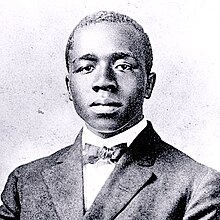
Edmund Thornton Jenkins (1894–1926) was an American composer who spent much of his life in Europe.
Biography
Charleston
Jenkins was born in Charleston, South Carolina where his Baptist-minister father, Reverend Daniel Joseph Jenkins, had set up and run the Jenkins Orphanage, which became internationally well-known for its wind band. Edmund Jenkins studied clarinet, piano and violin at the Atlanta Baptist College (now Morehouse College), and played in and directed the Jenkins Orphanage Band.
London
In 1914 the orphanage band travelled to England to perform at the Anglo-American Exposition in London. Edmund remained in London where, aged 20, he enrolled at the Royal Academy of Music (RAM) to study clarinet, piano, singing and composition. At the RAM he was awarded an orchestral scholarship (1915–17), prizes for singing, clarinet and piano playing, the Charles Lucas prize for composition (1918), Battison Haynes prize for composition (1918) and the Ross Scholarship (1919–21). On leaving the RAM he was made an Associate of the Royal Academy of Music. While in London Edmund Jenkins worked as an orchestral musician in theatre orchestras and dance bands resulting in his participation in a number of recordings.
Paris
In 1924 Edmund Jenkins moved to Paris where he established the Anglo-Continental-American Music Press while also performing and composing. He died in Paris 'from causes unknown' after being admitted to the city's Tenon hospital.
Works
Chamber ensemble
- (n.d.) Chanson; violin and piano
- (n.d.) Commodo quasi allegro (poco martial); piano and solo instrument
- (n.d.) Dance; cello and piano
- (n.d.) Romanesque: violin and piano
- (1916) Overture to Much Ado about Nothing; piano and strings
- (1919) Andante quasi lento, or Allegro energico; flute, 2 clarinets, horn, piano
- (1919) Rêverie-Fantasie; violin and piano
- (1919) Slow movement and rondo ; woodwind quartet
- (1925) The Saxophone Strut; saxophone and piano
- (1926) Sonata in A minor; violin and piano
Opera
- 1924 Operetta: Afram, ou La Belle Swita, Roman Africain
Orchestral works
- (n.d.) Allegro strepitoso
- (n.d.) Andante, with solo clarinet and solo cello
- (n.d.) Ballet: Processional; Pas Seul; Danse Generale
- (n.d.) Concerto; for clarinet
- (n.d.) Rhapsody on American Folk Tunes)
- (n.d.) Rhapsodic Overture
- (1917) Prélude Religieuse, with organ
- (1918) Romance, with solo violin
- (1925) African War Dance
- (1917?/1925) Rhapsody No. 1: Charlestonia, op. 12
- (1917/1926) Folk Rhapsody No 2: Rhapsodie spirituelle'
- (1926) Symphony, op. 12
Organ
- (1917?/1926) Prélude Religieux
Piano
- (n.d.) The Cabaret Brawl, or Double-crossing the Stool Pigeon
- (n.d.) Characteristic American Indian Dances
- (n.d.) Negro Symphonie Dramatique. Scenes de la Vie d’un Esclave
- (1920/1925) Spring Fancies
Songs
with orchestra
- (1916) Love’s Hour
- (1917) How Sweet is Life
- (1925) That place called Italie
- (1926?) A Prayer<
with piano
- (n.d.) I want You Near Me
- (n.d.) Je te desire pres de moi; fox-trot'
- (n.d.) Jungle Blues; fox-trot
- (n.d.) Kiss Baby Good Night
- (n.d.) The Lilac Tree
- (n.d.) Pampa Blues
- (n.d.) 'Si je vous dis, je vous aime
- (n.d.) Through the Metidja to Abd-el-Kadr
- (n.d.) Trying
- (n.d.) Your Voice I Hear
- (1910) Baby Darling, Baby Mine
- (1916) Love's Hour
- (1917) A Romance
- (1917) Doubting
- (1917) The Fiddler's Fiddle
- (1925) Amber Eyes
- (1925) If I Were to Tell You I Love You
- (1925) Three Songs: Doubting; A Romance; The Fiddler’s Fiddle
- (1926) A Preyer
- (1926) That Place Called Italy
External links
- 'A Charlestonian Rhapsody: The Story of Edmund T Jenkins'. Sunday Feature. BBC Radio 3. First broadcast 16 April 2023
- Charlestonia (composed 1917) for orchestra. Score. Online resource: musescore.com, accessed 22 April 2023
- 'Charlestonia: a folk rhapsody' by Edmund T. Jenkins. Performed by an un-named studio orchestra conducted by Philip Brunelle. YouTube. Online resource, accessed 27 April 2023
- 'Class of 1918: Edmund Jenkins & Evelyn Dove', 200 Years of the Royal Academy of Music. YouTube. Online resource accessed 27 April 2023
- 'Top Songs of Edmund T. Jenkins'. Black Europe. The Sounds and Images of Black People in Europe pre-1927. Vol. 12. YouTube. Online resource accessed 26 April 2023.
- Prélude Religieux (pub. 1926) for organ solo. Score. Online resource: archive.org, accessed 20 April 2023
References
- The Music of Black Americans: A History. Eileen Southern. W. W. Norton & Company; 3rd edition. ISBN 0-393-97141-4
- ^ Edmund Thornton Jenkins: The Life and Times of an American Black Composer, 1894-1926 by Jeffrey P. Green (Westport, Conn : Greenwood Press,1983) ISBN 9780313232534
- 'American Composer: At Home Abroad' by Betty Hillmon et al. The Black Perspective in Music, Vol. 14, No. 2 (Spring, 1986), pp. 143-180
- ^ The Edmund Thornton Jenkins Collection, 1917-1940. Columbia College Chicago: Center for Black Music Research Collection. Online resource, accessed 14 April 2023
- ^ Dominique-René de Lerma. (1990) 'Black Composers in Europe: A Works List'. Black Music Research Journal, Vol. 10, No. 2 (Autumn, 1990), pp. 275-334